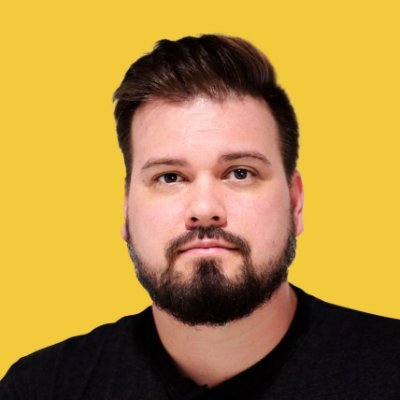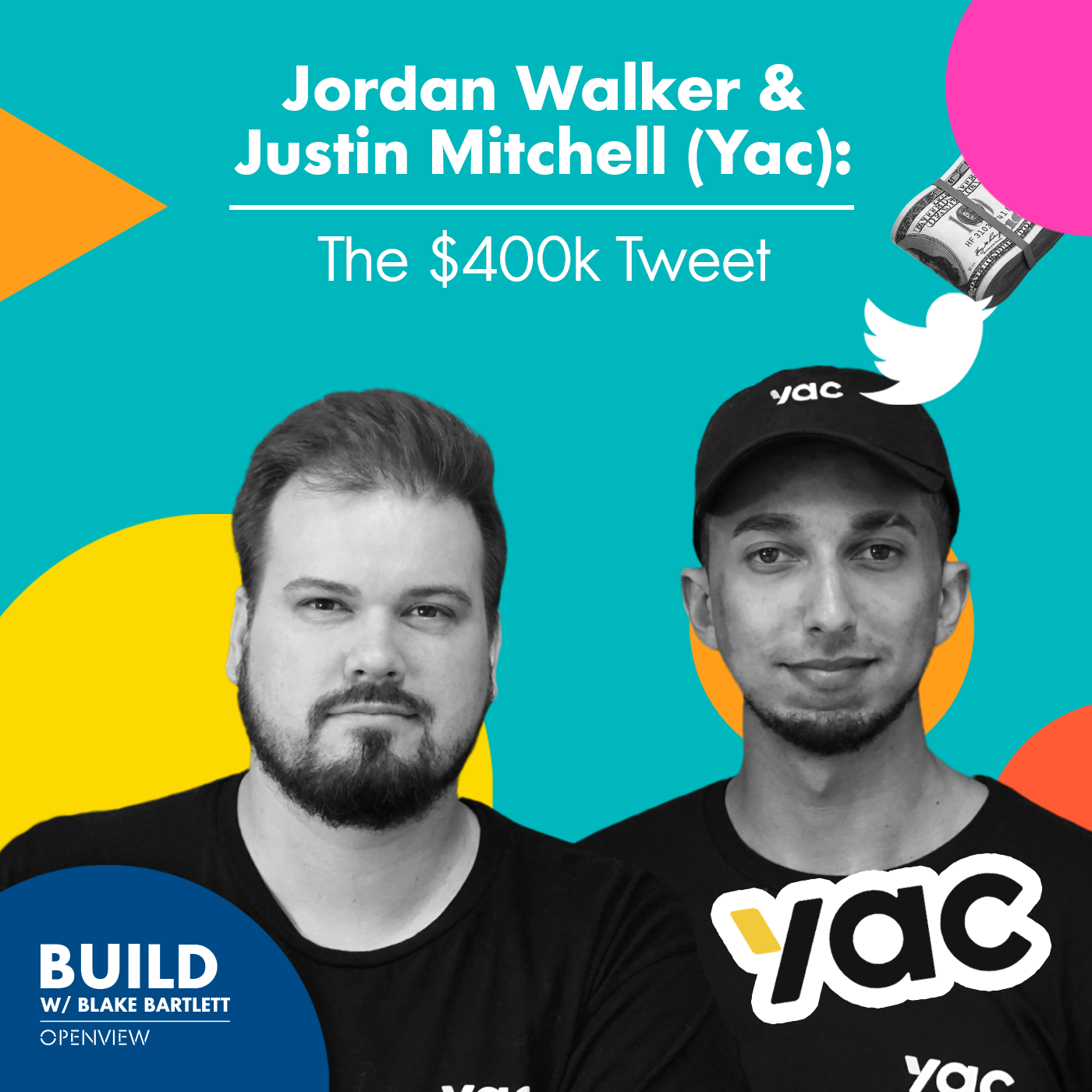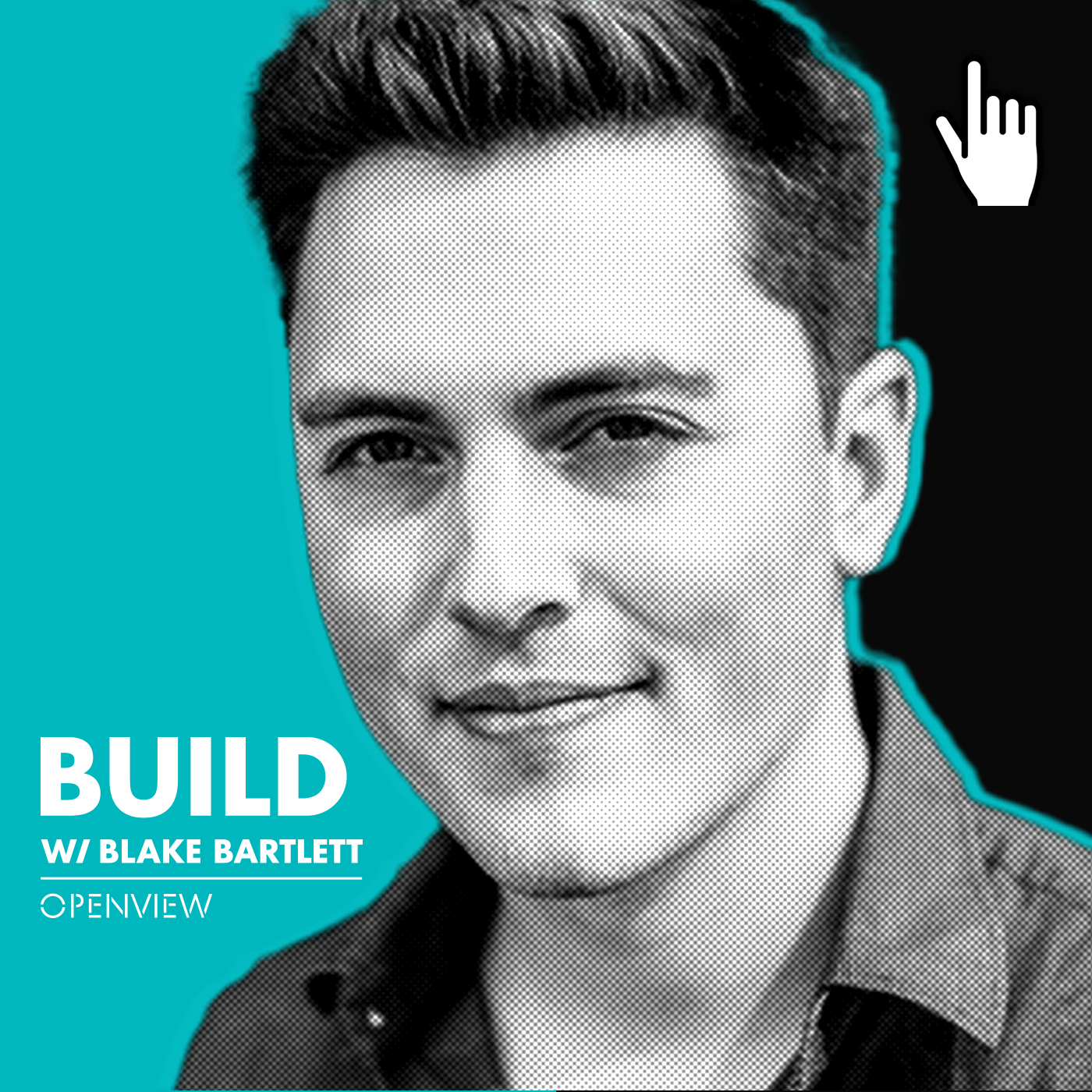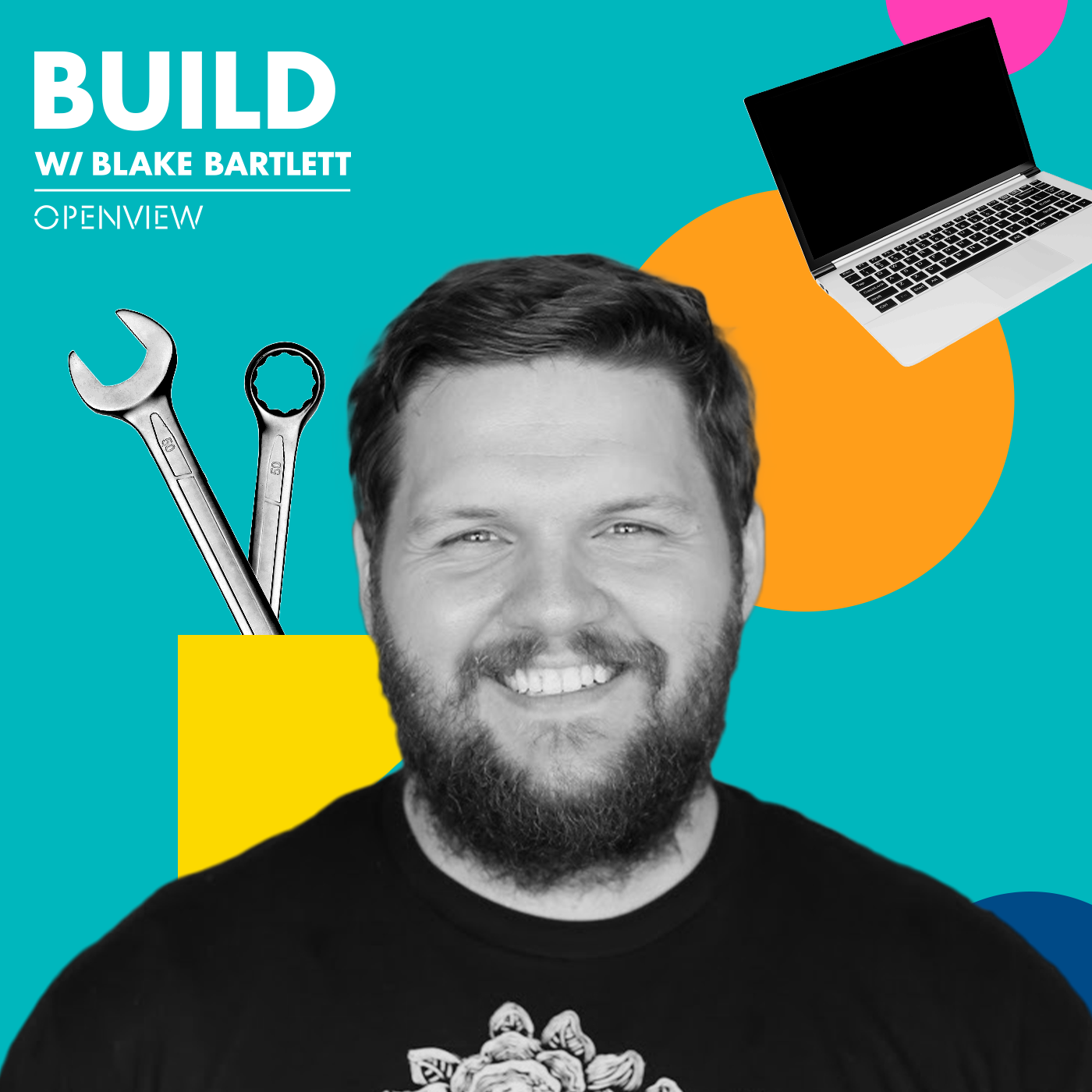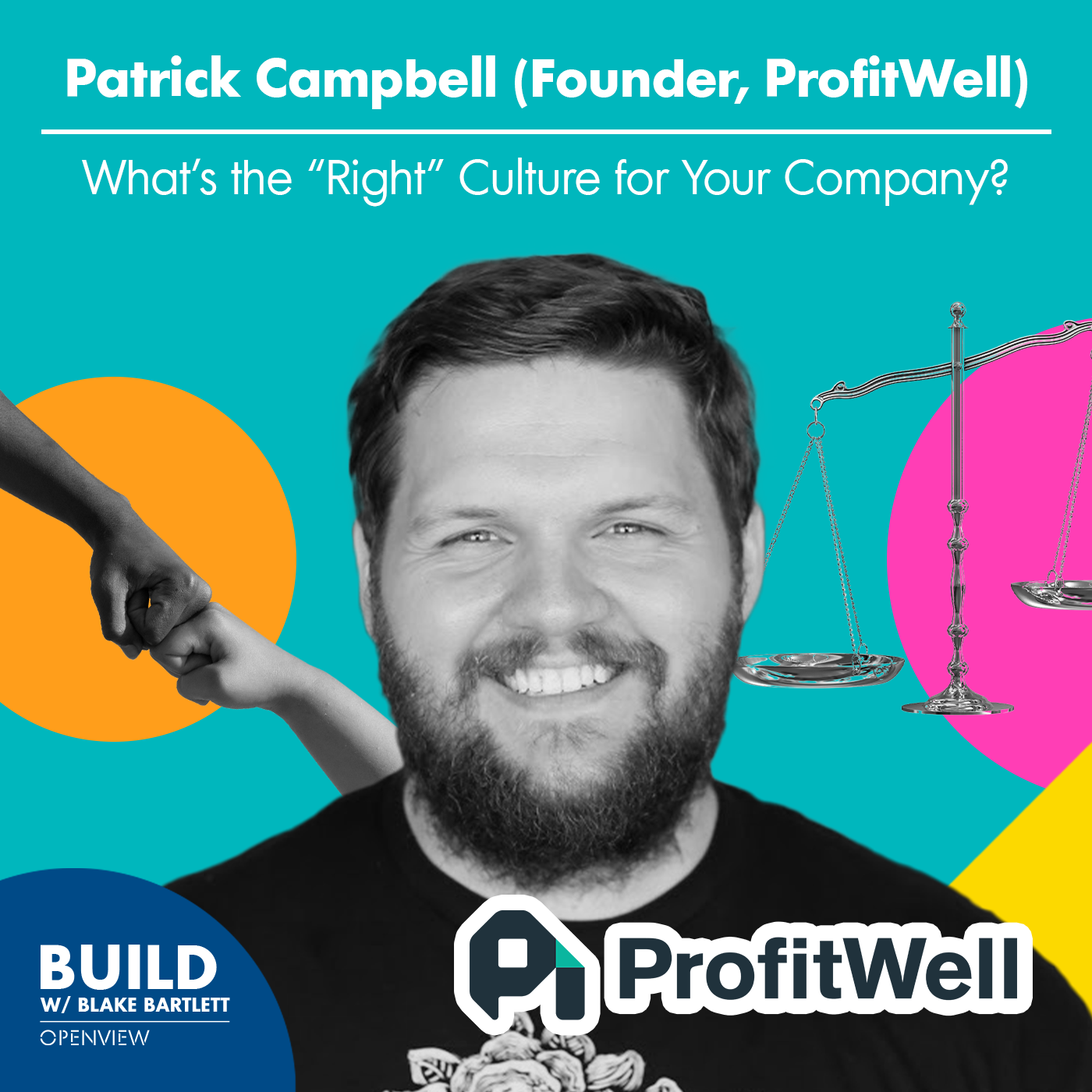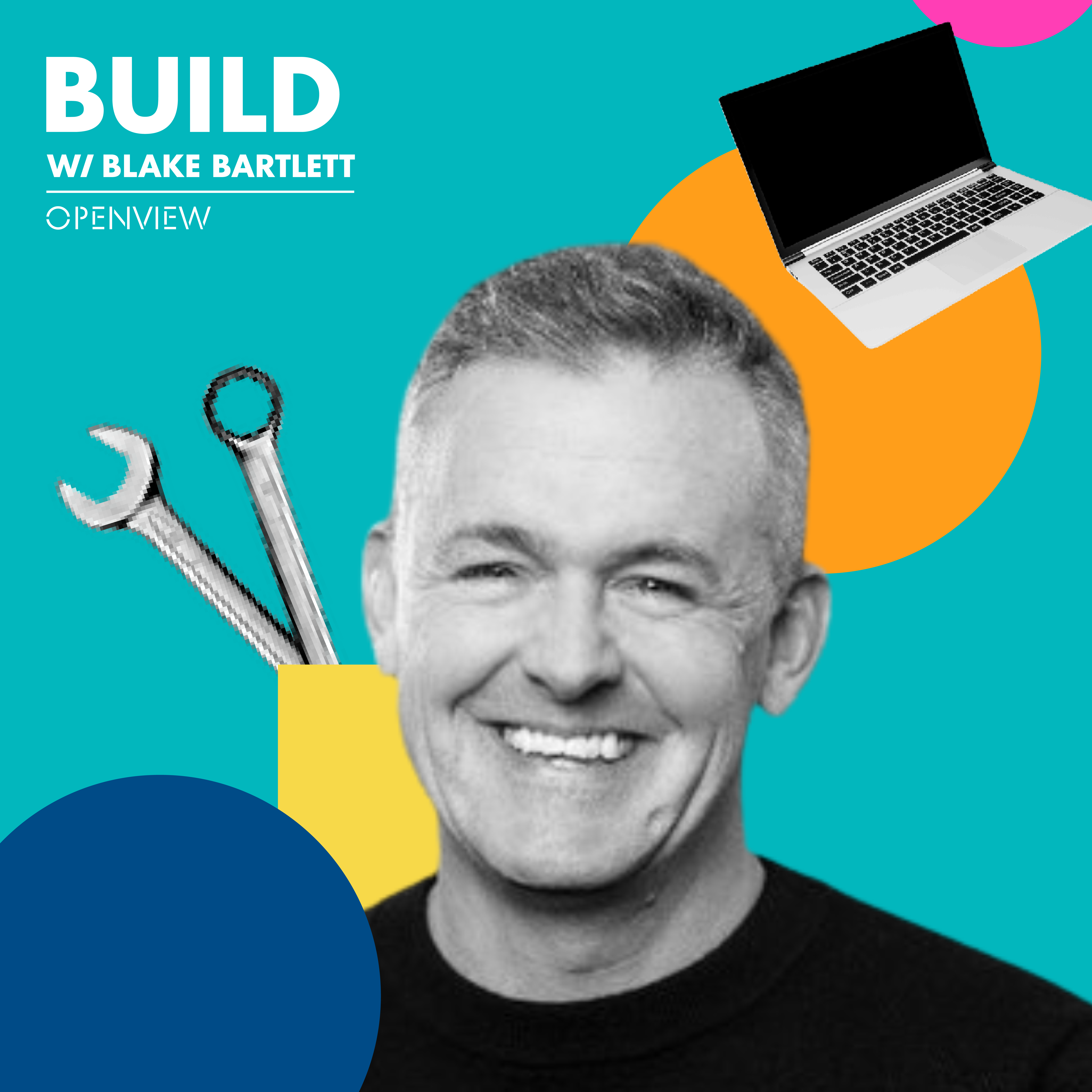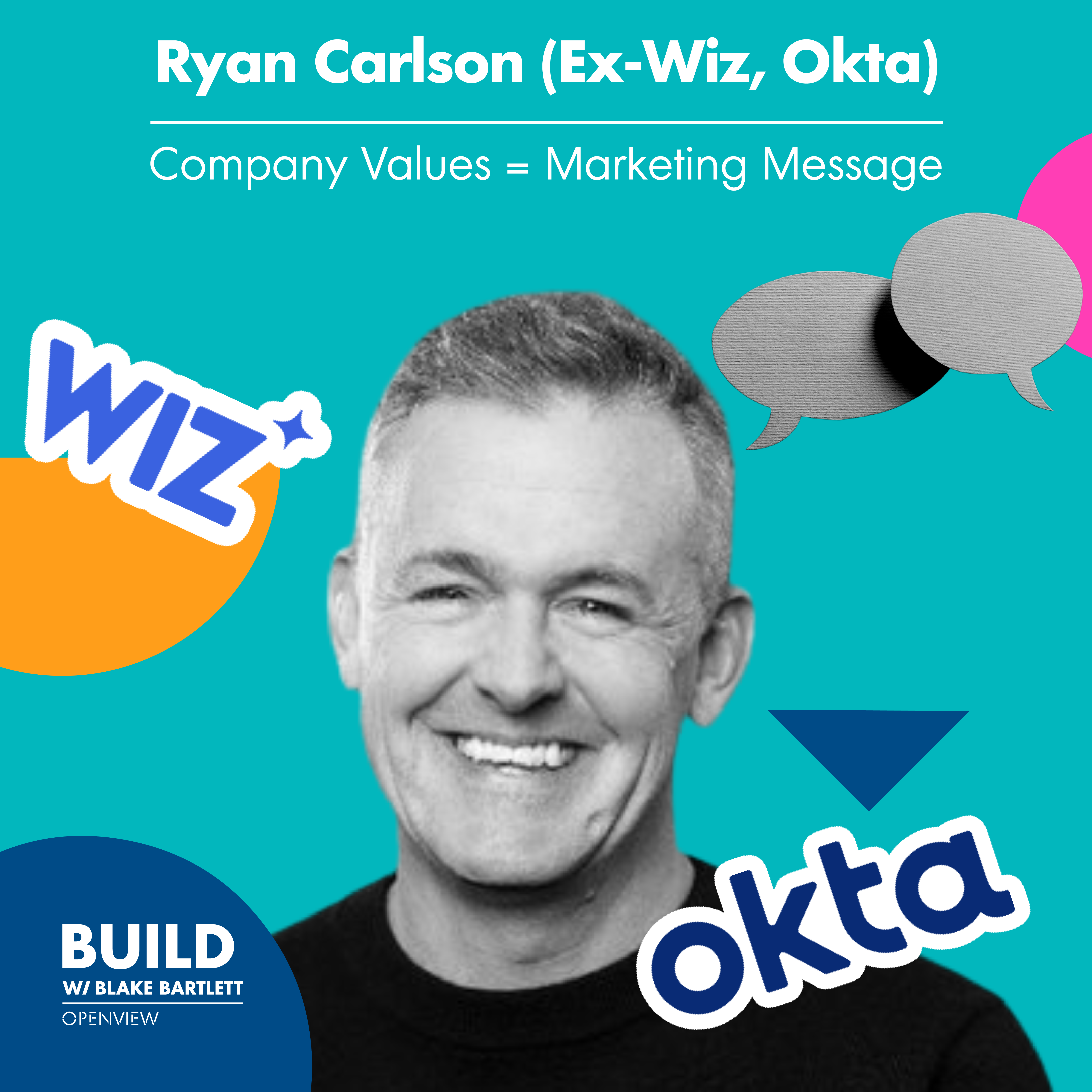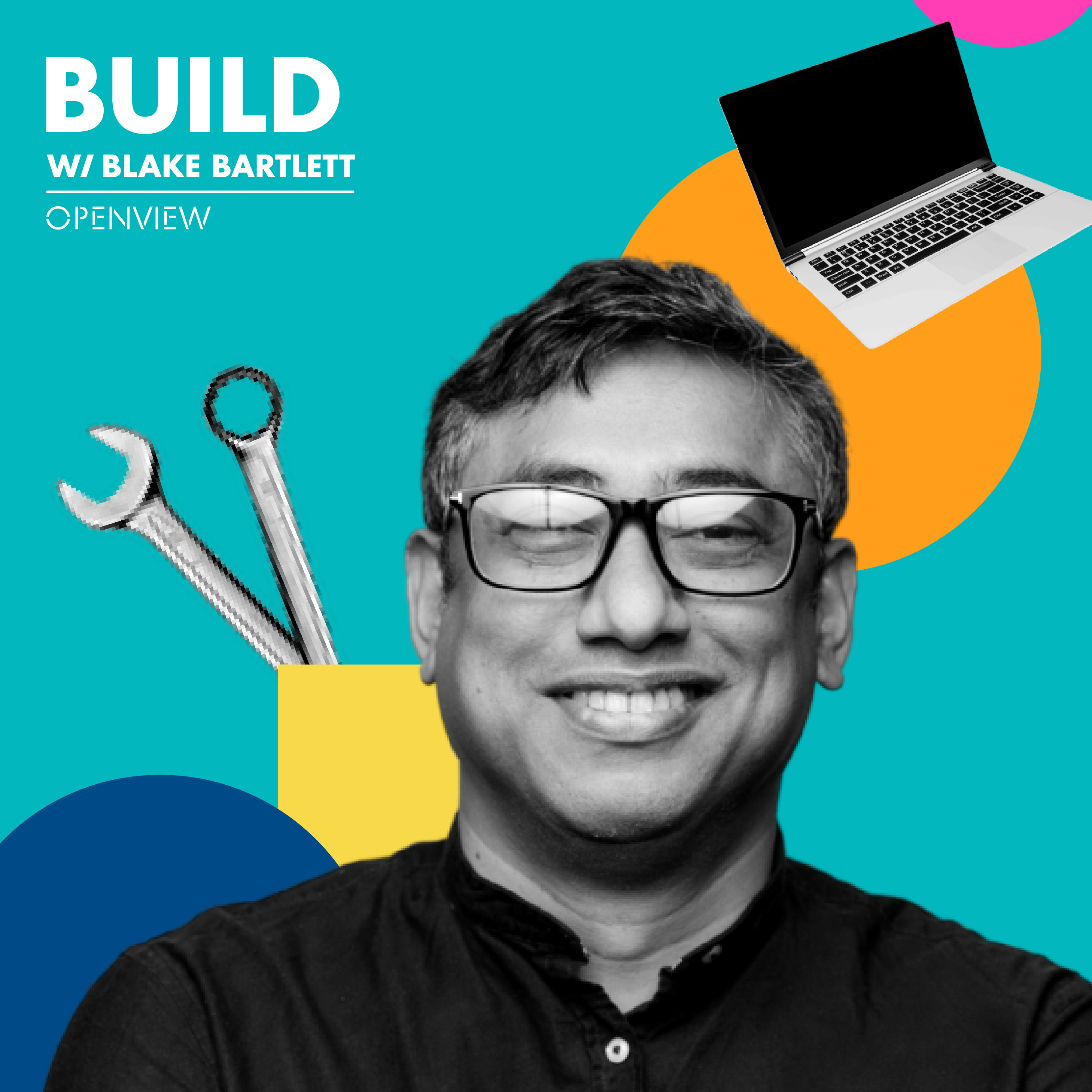Jordan Walker & Justin Mitchell (Yac): The $400k Tweet
- 0.5
- 1
- 1.25
- 1.5
- 1.75
- 2
Justin Mitchell: When you have a hidden agenda, everybody knows. If you have an ROI in mind for your community, they know. And for us, our ROI was just being nice.
Jordan Walker: This community is probably 10X worth any other community out there right now because we've just been real patient with it, taken our time with it, making sure that these people all kind of have line goals, interests, similarities, values, morals. I'd say the biggest key thing that I would say there is let it be organic.
Blake Bartlett: Welcome back to the Build podcast. I'm Blake Bartlett, a Partner at OpenView. The world of SaaS is always evolving and we are here to help you adapt, compete, and win with your startup. The Build podcast brings you stories and insights from my conversations with the most successful people in SaaS. In today's episode, I chat with Justin Mitchell and Jordan Walker, co- founders of Yac. Yac stands for Yelling Across Cubicles, which is the perfect name for a walkie talkie app that powers asynchronous audio messaging with your remote team. Yac's founding story is fascinating. It started out as a side project for Justin and Jordan's agency to show off their skills and attract new clients, but after winning a big Product Hunt hackathon, investors started tweeting at them. And pretty soon, those tweets turned into a$ 400,000 seed round and Yac officially graduated from side project to hot startup. But that awesome founding story is really just the tee up for Justin and Jordan's amazing advice on how to cut through the noise and create real, genuine community online, whether on Twitter or any other platform. All that and more on this episode of Build. Let's dive in with Justin and Jordan from Yac. Well, Justin and Jordan, thank you so much for joining us here on the Build podcast. It's great to have you on the show.
Justin Mitchell: Yeah, absolutely, man. Thanks for having us.
Jordan Walker: We're super excited
Blake Bartlett: Before Yac, you guys ran an agency together called So Friendly. How did you go from starting that to starting Yac and building Yac?
Jordan Walker: Oh, let's see, Justin, do you want to tell the founding story? It's kind of wild.
Justin Mitchell: Yeah. I mean, it's really cool how our entire team has come together in general. I started So Friendly as kind of an extension of my own freelancing business. I've been freelancing for a little bit to help fund a previous startup. And after that IPOed, I decided I wanted to go back to freelancing, but this time I wanted to do it a little bit more real, I guess is maybe the word, a little bit less scrappy. And so we started an official agency, Hunter who's one of the other co- founders here, worked at my startup as an intern. And so I brought him in and his roommate in college was Jordan. At the time we really had a lot of talent for dev and design and we just needed people that were really good with people. And so, yeah, we brought these two guys in to help run this agency with me and side of that, we loved building products and we build products for other startups obviously, but once in a while we build something we thought was cool and that's kind of where everything went from there.
Blake Bartlett: And you guys are based in Florida, right? So we were talking a little bit about this before we started recording, but are you in a tech hub? Are you not in a tech hub? What was that like building an agency and tell us this story there.
Justin Mitchell: Jordan, do we have a one Florida client, maybe?
Jordan Walker: Total, we probably had five Florida clients, but in general, everybody else is pretty much anywhere else in the world where we live in Orlando, I would not call it a tech hub. It's just very, suburbany kind of normal city. So a lot of the work that we did was online and finding client in networking and doing that stuff on Twitter, on Product Hunt and on all these other places where these startups and investors are kind of like looking to build and meet people.
Blake Bartlett: Let's get into that story of how Yac sort of came about. So you're building the agency, you're in the Orlando area. And my understanding is that it was the maker's festival for Product Hunt that sort of led to Yac. But what's the story there?
Justin Mitchell: Yeah. I mean, we love this story just because it's all accidental. I was already a pretty big product. Hunt guy had been hunting products there for a while, as well as just being involved in the community. We'd obviously put some of our stuff on the site whenever we did something we thought was cool and wanted to share it with people. And so they were doing this maker's festival and it said, hey, we're going to give you a bunch of categories. You guys build something for it and we'll have a contest. And for us, we thought, hey, this is an opportunity for our agency to get in front of like our ideal target audience, makers, startups, founders, people that need developers and designers to build products for them. So for us, this is a marketing funnel. Okay. Let's put some marketing fun into it. And we were going to build a product that we hoped took off and just got some interest so that people come to us and go, wow, they built that product, they could build my product. And we did that. We built something over a four day weekend. I've worked remote my entire life. I've had this kind of way of working and a system that's worked for me. And so one of the categories was remote work and I thought, all right, I can build something for the remote work audience. And we're just kind of hacking on this idea. And what I told the team is I wanted a product that just gave the vibe of yelling across cubicles. And that's where one of our designers goes, we'll call it Yac. And I was like, oh, that's perfect. So that's the origin of the name Yac right there, Yelling Across Cubicles. It was really just this idea of how could you simulate this concept of just the ease of communication that you would have in a regular office. And you see a lot of startups now that are building this sort of like replace the office with an online office thing. And that was never really our desire from the beginning. It was really just to create a system or a platform or an app, whatever you want to call it, that just made it easier to talk to your team over voice, voice being like the very important part of all of this. And so, we built this thing that we just wanted to use internally, because it was one of the things I knew we were missing as a team that was ever growing all across the world and we used it ourselves, thought it was pretty rad and then pushed it into the Makers Festival. And I do think there was a little bit of a misunderstanding on my end from the rules. We were the only ones who actually built like a fully working application that you could download, utilize and actually get use out of. Everyone else was building landing pages and designs and stuff like that. So I think I misunderstood and thought we were supposed to actually code everything, which I mean, I guess it ended up working out for us in the end, but I think that's the only reason we won the actual maker's festival is they were like, well, these guys built a full startup in four days. We kind of have to give them the prize. So yeah, I mean, we got mentioned their newsletter, on their Facebook, on their blog. It just got written up everywhere and that resulted in just a bunch of downloads across tons of different industries and that's yeah, sort of the Genesis of Yac for us.
Blake Bartlett: So you didn't intend to start a startup. It sounds like this was more about getting, initially getting business to the agency, but then it kind of spun into something bigger than expected. Is that how you think about it?
Justin Mitchell: Jordan and I, we're doing good. We very pretty happy with the agency with where it was at. I'd done startups before, they kind of sucked, they're soul crushing sometimes. And so we had legitimate conversations, just the two of us, do we want to do another startup or do we want to keep doing what we're doing just suddenly become pretty successful. And we're enjoying what we do.
Jordan Walker: Product Hunt ended up putting out a blog that Justin had put together called the$400, 000 tweet, just kind of that really captures, hey, this thing went from accident to funding to now fully backed venture startups, which is pretty cool. But yeah, I mean, at the time it was totally see how we can get more clients and customers for the agency for So Friendly at the time.
Blake Bartlett: So let's talk about that$ 400,000 tweet. When did you know, okay, we have something on our hands, maybe we should go all in on this and how did that decision making process happen? Walk me through that.
Justin Mitchell: I mean, I think we first knew that we had something on our hands in general, which was when bigger companies started downloading Yac. So we had companies like CVS Pharmacy or Roche Healthcare, Bar Stool Sports, Envision, bigger companies started downloading the app. Okay. This is interesting. I didn't even think that this would've been Product Hunts core audience. So obviously, we were wrong there. And then we started talking to a couple of these companies and we're like Roche healthcare, you don't really strike me as a remote first company. I'm like, oh, well, our section of the company all work from home and everybody else works in the main office and we need to talk to them, started realizing, all right, well, our assumptions were also wrong there, these bigger companies do have remote work policies to some degree. And so it became obvious to us that at least there was more utility outside of what we thought at the time was a relatively small community. And so we at least started building on top of it. We added screen sharing, we were improving it, making sure it was bug free, things like that. I don't think there was still really any intention on our end that we would keep this thing running and build a full startup out of it. But the first step was realizing just the validation. There was a little bit of validation. After that, it really came from us sitting in a hotel room together at CES. So we're in Vegas, we're all sitting around, we're hanging out and I got a Twitter notification. That wouldn't mean anything to me at the time. I was like, this is odd. How did I get mentioned? And so I looked into it and it was somebody just saying, hey, at Adam Draper, you should take a look at this company to see if you want to back it. And they just mentioned me and mentioned the maker's festival project. And he literally-
Blake Bartlett: Was it somebody you knew?
Justin Mitchell: No, I never met this guy before.
Jordan Walker: We're friends with him now, because, well we owe him, literally we wouldn't have a company without him. inaudible Aiden Wolf shout up to him. But yeah, we had no idea who he was before that.
Justin Mitchell: Yeah, no clue. But Adam DMed me right after that and got on a phone call with me. And I guess Aiden had just downloaded the app during the maker's festival. It was a complete serendipitous thing. Weeks later, months later, Adam had tweeted out that he wanted to invest in somebody doing audio. And I guess Aiden remembered our app and was like, this is really cool, I think you should talk to Justin and Adam got on a phone call with us and was like, yeah, I'm in, how much money do you need? And we're sitting around together in a hotel room that we got for free from my in- laws because they have a time share, like we're not rolling in dough. And Adam goes, how's a hundred thousand dollars sound and we're going, oh my God, it sounds amazing. I could build so much with a hundred thousand dollars and you quickly learn when you're building a startup that a hundred thousand dollars is not actually that much money, but at the time we have to say yes, right? Why would I turn down a hundred thousand dollars? And that's sort of like the kickoff to all of this was going, wow, someone will actually give us money for something that we don't have a pitch deck for. We don't have an actual company for, we barely have a website for, yes, there's a download, but it's buggy and barely worked-
Jordan Walker: It was rough, man. It was rough. Yeah. We were real surprised that Adam even made an offer because yeah, everything was just so scrappy at the time. Just so scrappy at the time.
Blake Bartlett: At any point in this process, did you think, is this real? Is this weird? Like what's happening right now?
Jordan Walker: I mean, I think we did after the initial call, we all just kind of sat around and looked at each other because we were sitting in the living room and Adam called and we just were kind of looking at each other, like this is really happening and none of us had any VC experience at the time. So we're like, is this a scam? Like, is this real, are we actually going to get the money? Like how does this work? See, I mean, I think initially after, we were all just sitting there, literally just like this, like scratching our heads going, what the heck just happened.
Justin Mitchell: We didn't know VCs. We didn't play really in that world. And so is this real, is he legit. There's a lot of scams out there on the internet offering you money. And it was also sudden and kind of like out of nowhere that we weren't quite sure what happened. So like literally the next 15 minutes was like Googling Adam, Googling Boost VC, seeing that it was all legit and then going like holy crap, like an actual venture capital firm is interested and it just snowballed from there. Adam introduced us to Betaworks and at the time Hunter and I had been listening to the startup podcast by Gimlet Media. So we knew that Betaworks and Spotify and Anchor and Gimlet Media and like all these things that we loved were all interconnected and we just went, oh my God, like they're, we know them, we know that name. Like that's something that we recognize. And so we got introduced to Betaworks. We pitched to them over zoom. This was pre pandemic. But at the time it was, I'm not flying out to California. We have zoom, I'll just do a zoom call. And so we started the trend, I guess, of remote pitching long before that was just a requirement for most startups. And we talked to Betaworks, I did three individual calls with them, one with each main investor there and somehow convinced them to also give us money for that round.
Blake Bartlett: So everywhere you're looking, you're getting validation. This sounds like product market fit to me. Is that how it felt at the time?
Jordan Walker: The other important thing to mention there too, is that we had always thought that audio and remote work were going to be popular in like five years from then, or like seven years from then, not with the immediate explosion that COVID kind of gave us, we thought this was still years in the future. We were kind of set the groundwork now and then be prepared for a point later in time. And then before we knew it, everybody was wanted remote and audio products all at once. And so it got really accelerated. So I think in that moment, yeah, maybe there was like a bit of confusion during that year, but as things kind of gradually changed, like Dustin said, we made the switch from synchronous to async. We started to see things really start to come to life more for us.
Blake Bartlett: So you get the$400, 000 tweet. You raise the capital, you go all in on Yac. But then as the business continues, the next round happens and Twitter played a pretty big role in the next round too, right?
Justin Mitchell: I mean, Twitter plays such a huge role in just literally our entire story. We said this early on, we weren't connected in this space. I didn't even know who Adam Draper was. And for us it became, oh wow, all it takes is one tweet for you to get someone to fund you. But if it only takes one tweet for someone to use you, right? And so it started becoming this way for us to network online. Let's share this with other people, let's find other investors this way. Let's find other partners this way. And we really started to amp up our Twitter game a lot after to that. Obviously we'd had some really good press with like Product Hunt and some other things that had happened at the time. But for us, it started to become this idea of, we can leverage Twitter, not only to find investment, but to find customers, to build our own personal brands. And so we just started using it as a way to meet other people in the space. This is how we started getting invited to conferences to speak at. It's how we started to get new companies on the platform. And yeah, Twitter just became this huge viral opportunity for us to latch on to people who are already sitting on the internet all day and in our target demographic. And we can just find them. So for the second round, a lot of what we were doing is, I would literally sit on Twitter, I would find a VC and I would just hit the follow button. And then underneath on Twitter, they have who also to follow because it's based off of the other follower that you just did. And I'd literally just sit there and spam because it would just replace a new person into that list. And by doing that, people would check out like, oh, who just followed me. And we each had this like just perfect Twitter bio set up, like mine literally just said currently raising our seed round, right check out Yac. And people would check out a product just because they saw my Twitter bio and then they would send us DMs. And so that's how we just kept getting all this interest. And at the same time we were going back to our classic days at So Friendly and building other products. So we built a product called BRB, which was just a blue version of Yac that had sign in with Snapchat. It was part of a product at Makers Festival. And we even got investors by building that, putting that out as its own brand, people being interested in that as like a social audio thing and not related to work or remote work necessarily. And then finding out that we built it and then DMing this about that. Jordan can speak specifically about actually who led our seed round.
Jordan Walker: Pat from act capital, shout up to him for leading our initial seed round. And the way that we got connected actually was through Twitter DMs. There's a whole mess of a story on us getting a term sheet revoked because we wouldn't move the company to the valley, which in retrospect, it's insane thinking about it, because we're a remote first company. But anyway, we had a term sheet pulled from us and so we were like, you know what? We need to go like find like another round of funding, inaudible somebody to lead our seed rounds. So I actually got connected with Pat's partner, Chris at active capital, saw that he followed the Yac account, DM them and said, hey, we were just talking about sports initially. And then about a week and a half, two weeks kind of went by and started talking about, oh, hey, what's Yac? Where you guys are at? How would do we make this thing happen? And before you knew it he ended up leading our seed round. And then Justin had mentioned, how BRB brought us one of our investors. And I got connected with Wiz from Space Cadet Adventures. And he actually found BRB. Well, he actually, what was he looking for? He was looking for like audio messaging tools, saw BRB and we just happened to be having a conversation around like his podcast or something like that. And then I remember he sent me a screenshot of like Justin filing, like the trademark or something like that and was like, oh my God, this is actually you guys too. Like, this is all the same thing. And I was like, yes, that's us, this is so exciting. Before he knows it, he is like, dude, can I please put in a check? Like this is really cool. So we found him that way. And then I think one of the last inaudible people in our seed round that came from Twitter was probably a anchor from Teachable, just a random cold DM that he sent me and said, hey, I'd love to just like get you money. I see you guys make a lot of noise on Twitter. This one's cool. How do we make it happen? And so, we were able to get the deal done in that sense. But yeah, I mean literally 75% of our seed rounds came together just off of the back of Twitter, which is really cool.
Blake Bartlett: Let's get into how to make Twitter work for you. So you kind of all had this realization of let's amp up what we're doing on Twitter, this seems to be working. And Justin, as you were saying, it can work for investors, but it can also work for customers, for partners, the list goes on. So what does it look like to amp up your Twitter game? How do you approach it? Walk us through that.
Justin Mitchell: Inside of social, you have this actual concept called like social pods, which is we have like a group of they're liking and retweeting and sharing all of the stuff for you. And sometimes people do them in slack channels and discords, and you just dump your tweet and everybody retweets that. We basically took that concept and instead of it being like a paid thing where we paid people to like all of our stuff for us, we were just really nice to people on the internet. And it ended up that we started building these very genuine, real relationships on Twitter with people that we've, I mean, to this day, like I've never met Garrett Scott in real life, but like I know his really cool startup and I recognize his profile picture anywhere. And I like and retweet all of his stuff, right? There's just all kinds of people like that, that we've never really met in real life. And we actually just got back from New York a couple weeks ago where I did meet some people for the first time. They were just relationships that we built online, that we liked what they were building, we thought it was really cool what they were working on, started to kind of support them through just anybody mentioning like, hey, what's a cool founder that I should talk to. And we just, at like a couple of our friends that we'd met on Twitter and the next time that somebody says what's a remote work tool that I should be using, all those people are now mentioning Yac. And so we started to just kind of build basically like a social pod, but out of actual friendships that we built online and what that translated to was getting into these conferences, getting into these partnership opportunities, getting mentioned into and threads with investors that came in and eventually wrote checks into us, us doing the same thing for them. And now we have this kind of like group of people online that we all support, they all support us. And that translates into a ton of success just generally around everything. And for us, it's become this idea of, I guess, really what you put out into the marketplace eventually comes back to you as well. But we're trying to position ourselves as market leaders. And we have definitely dominated like asy voice remote, things like that. But we also really want to dominate the sense of like who are three people on the internet that will help you, right? You want anybody that you have questions about, tech I'm here, like ask me, I will answer anything. You have questions about fundraising, we're all here. You have questions about marketing, ask Hunter, you have questions about branding and what's hot right now ask Jordan, right? So like we each kind of have our things that we're available to anybody for free at any time you hit us up and we've built a brand around that. And there's a level of selfishness behind that, that obviously helps us in the end, but really for us, it's just about having this image and this style of we're available and we're here for you and that's translated, not necessarily just into good karma for us, but also into something that's really fulfilling. We enjoy helping people. A lot of the stuff that Jordan and I were doing at So Friendly, we kind of get to have a little feel, a little bit of taste for now, because we're hopping into other people's startups and just lending a hand. And it's really just like 10 extra business.
Jordan Walker: The biggest takeaway there is that really just showing up and just like giving without expectations. It sounds so cliche and so classic and like, I feel like all our parents tell us that when we're younger, but it really is the truth. A bunch of our friends and people that we know and love on Twitter, those conversations started out just because we just thought the person was cool.
Blake Bartlett: What I'm hearing from this is that there is not a single silver bullet. It's not like there's this Twitter hack. And if you do this one thing, like you're going to go viral. And the other thing I'm hearing is that this is not rocket science, be genuine, be nice and then keep doing it. And sort of, as you were saying, Jordan, give without expecting something in return and what do you know, something in return will happen eventually later and karma will sort of pay you back, but this doesn't seem to be rocket science.
Justin Mitchell: No, I mean, it's human, right? Like it's not, Jordan knows more than anything. If I could name one thing I hate most it's like LinkedIn automation, like I hate automation software. And it's because it removes the human element. And for us, it was just about if these people were in real life and we were in like a co- working space together. We wouldn't just ignore them. Like if they asked us a question in real life, we wouldn't ignore them. And I think that's sort of like the magic of remote in general. And if you apply like the concept of remote to just like the internet, if you think about how you would handle a situation, if you were in a physical space with that person, like you should handle it the same way on the internet. And so for us, it was like, sure, yeah, come sit down, let's work through your problem. I mean, in fact, Jordan, you just want to talk generally about Emilio and his story.
Jordan Walker: Oh yeah. So Emilio he's our marketing specialist over here at Yac. So all the funny tweets that you see on the Yac account and all the crazy videos that we make, that's all Emilio and he's super, super, incredibly talented. But the way he actually initially came to us was years ago when Justin and I were doing So Friendly full time, he actually sent me an email saying, hey, I'm basically a kid, I have my own company. I just like really need some help and guidance. Can you please just like helped me? And I was just like, you know what? Young kid hustling, like absolutely give me a call right now. So like I called him within like 10 minutes and he's like, oh my God, this is so cool. I invited him out to our office one time, came to the office, he like really wanted to hustle, really wanted to learn. And he was like, hey, is there anything I can help you guys with? You've just given me so much value for free. And so, we're like, hey, well actually there is some stuff. He just kept showing up and showing up to our office. And then he started helping Hunter with some marketing stuff. And before we know it, we were like, wow, this kid's got like some serious talent, some real hustle to him. Let's offer him a full time job. And so we did and before we know it, Emilio has been working with us for years now. He is running the actual inaudible, he's making all the content for us and it's just like add absolutely crushing it. It's crazy to think if we chose to ignore that random email on the contact form on the store friendly website, we would've never met him, we would've never had these awesome videos, we would've never made some of the impact that we've made without him. So it's just wild to think like, hey, whatever I might do earlier in life, who knows it might pay itself back 10X later. And it definitely has with Emilio before and he's one of our closest friends now.
Justin Mitchell: I think everybody knows how much pain an intern can be, sometimes. Like they can be amazing, but they can also be life sucking, right? You have to spend a lot of time and energy on them. You have to train them. And so there's a huge opportunity for us to see that email and just be like, we don't have time for this. We're running a startup. There's just absolutely no time to bring somebody in under our wing and teach them everything we know. That's not my job. And instead, Jordan's just like, yeah, like, come on down. Like, we'd love to have you come hang with us and we'll show you everything we know. And it's wild to think, just to piggyback on what Jordan said, that like these insane launch videos that you've done of, oh my God, what agency do you use for your videos? And we're like, oh no, that's just Emilio in his room, right? Like it's just one dude who has zero professional experience doing videos, cranking out these just like unbelievably well made things. And it's all just because we said yes to an email and we found this amazing talent as a result.
Jordan Walker: Yep.
Blake Bartlett: So it starts with saying yes. And then it continues with being human, being friends, supporting people and giving without asking for anything in return. And that is the, that's the secret, that's the special sauce and anybody can do it. And that's the beauty of it. I do think that people look at platforms like Twitter and just social in general and they see something that goes viral and they think they need to emulate that exact thing. I need to have a hot take. I need to be clever. I need to do this. Or I need to be controversial. Or like I need to throw shade or like, whatever it is, but that's not actually the magic bullet that's going to get you the thing that you want. Being human, being genuine and sort of treating this like exactly, as you were saying, this is how would you approach somebody in real life?
Justin Mitchell: There's a lot of fronting that happens on Twitter, right? You just said, I got to have that snarky tweet or I got to have that one viral thing that I come up with. Really, for us, it's been the opposite. It's not been, how do I get that hashtag to go trending? How do I make that funny joke that everyone retweets. My most retweeted liked shared posts that I've ever posted on Twitter was me complaining about mortgages and how hard it was to get a mortgage as a startup founder. And so, if that tells you anything, it just tells you that real is what converts. So me just being me and complaining about things that impact me on a daily basis was stuff that blew up. And so, we're short 50K for a check. I just tell somebody, yo we're short 50K for a check, somebody please write us a 50K check. And they're like, I will, I'm like, great. We're done. We're closed. That took 15 minutes to get that done on the internet. And it all came from just being real honest, transparent versions of ourselves.
Blake Bartlett: Zooming out. And I guess let's hit a buzzword here, community. Let's become a buzzword. Everybody's talking about it. Everybody's all in on community. We're kind of getting at community with this whole conversation, but what does that mean to you and how do you guys think about community?
Justin Mitchell: Community, a lot of times is forced and that's what makes community tough. I think a lot of people have attempted communities and there's a lot of slack communities, discord communities that you can join. The commonality there is probably a shared common interest and I don't mean this in a horrible sounding way, but I think most people's common interest is themselves. And so, we found a community of people who understand at a core level that they're trying to boost their business, their online profile, their tweets, and what that ended up becoming was a community of people, helping other people out understanding. And the goal is that they will help them out eventually. And so we just kind of swapped this like style of helping each other out and that's the community that we've built. I think community is a buzzword because especially right now with the pandemic, it's very hard to do things in real life. And so you have to try and simulate those online. And a lot of times it's very difficult to simulate that online. So for us, we're trying to build up a network of people with a common goal and a common interest, but without forcing it the organic effect there is, is the really important part.
Jordan Walker: Building real communities takes patience and it takes time, right? A lot of people just say, I'm starting a community. Then it just floods with hundreds of people that may not have common interest. Somebody may be a liability, like you just don't know, like it just get out of control real quick. It's like showing up to a party, right? Where you don't know anybody. You don't want to be the first person to like be on the dance floor or doing something crazy. Nobody wants that, everybody starts inaudible is better in small genuine groups where you can have real conversations then slowly kind of let it grow and expand. And so some of the stuff that we've been doing online, I mean really that's and the charges that I've been kind of leading for us is like, that's what I've been doing. Started out with four people, with five people. And now we have a community of about 20 people. And while it still may seem small, everybody in there engages with one another, every single day, literally every single day, somebody is messaging in there and people are talking and people are very happy with it. By doing that and being really patient with it because this is been probably two years in the making. This community is probably 10X worth any other community out there right now because we've just been real patient with it and taken our time with it and making sure that these people all kind of have line goals, interests, similarities, values, morals, et cetera, et cetera. So that's probably the biggest key thing that I would say there is that let it be organic.
Justin Mitchell: And I think communities also don't need to be not large, but in general, when Hey first started, when it came out with their email client, I got pitch @ hey. com. And I just said, anybody want to send me their pitch deck? I'll review it for free. I'll give you, what I did was I gave them a Yac. So I'd record my screen as a Yac. I'd send that over and give it to them. And what that turned into is me building this very slow, small community of the are founders, all getting pitch advice from me. I just had a founder last night who I actually reminded me that I never did my pitch review for them and said, hey, I just wanted to ping you again. See if you could take a look at my deck. And I looked at it and I gave them all this advice and end in the I was like, dude, I honestly want to invest in this. Where can I send a check? And he said, that's great. Are there any other investors that you think would commit? I'm like actually, yes. Like let me get you some investors now that will even write checks into this. And that's a form of a community that I think a lot of people don't understand, is that it doesn't necessarily have to be a group of people all interfacing with each other. It can just be a group of people, all interfacing with a common goal in mind. And so I've built up this like small community of a bunch of founders, and now I've built up a small community of a bunch of investors and now I'm matching them to each other. And so I have all these investors now in my network and I'm just pairing them with these amazing founders who are sending me their pitch decks for review you. So I think community in general can be defined a couple different ways, but the Yac team has just done a really good job of doing it like a very small micro scale. And then combining communities later on, because we have access to kind of this network now.
Blake Bartlett: I like that organic element too. And so just saying yes, just being open to it, just letting it grow organically and sort of blossom into whatever it's going to become and being less oriented towards like a specific ROI or outcome or something like that. That seems to be the secret too.
Justin Mitchell: When you have an hidden agenda, everybody knows. If you have an ROI in mind for your community, they know, and for us ROI, it is like just being nice. Yeah, absolutely. You can't hide that from somebody. When your ROI is this transparency of, we just literally want to build a community. I'm not going to try and data harvest you. I'm not going to try and upsell you to my course and whatever it might be. All of a sudden they're like, wait a second. This is just a genuine community. Okay. Yes. I would love to be here.
Blake Bartlett: Well, this has served to certainly demystify the idea of community and sort of unpack that buzzword for me. And then also to really just kind of help folks understand what does the concept of networking actually mean in today's day and age. Thank you guys so much for joining us here on the Build podcast today.
Justin Mitchell: Yeah, absolutely.
Jordan Walker: Absolutely, man. We were super happy to do this. Thank you.
Blake Bartlett: Thanks for listening to this episode of Build. If you like what you've heard, leave us a review on Apple Podcasts and subscribe to stay up to date with all the new episodes. Want more insights from OpenView. Follow me, Blake Bartlett on LinkedIn for daily PLG content and head to our website to sign up for our weekly newsletter.
DESCRIPTION
Yac started as an agency side project. But after winning a big Product Hunt hackathon, investors started tweeting at them. In a few days, Justin and Jordan were now startup co-founders, and those tweets turned into a $400k seed round. Hear how Yac made Twitter their best channel for everything, and how you can create real community online.
Key Takeaways:
[2:10] How did Jordan and Justin go from So Friendly to starting Yac?
[3:18] Are Jordan and Justin in a tech hub?
[4:02] What was it like to build Yac?
[7:00] Justin talks about how Yac certainly got bigger than expected.
[7:47] Justin and Jordan speak about the $400,000 tweet.
[11:06] Justin and Jordan initially felt it was unreal to get funded for Yac.
[12:33] Justin and Jordan started the trend of remote meetings prior to the pandemic.
[12:53] Did the origin of Yac feel like a product-market fit?
[13:42] Justin and Jordan explain how Twitter played a big role in the second phase of developing Yac.
[16:03] Jordan shares how they kept connecting through Twitter.
[17:45] How did Jordan and Justin make Twitter work for them?
[21:28] Be genuine, be nice, and keep doing it.
[22:26] Jordan talks about Emilio, a key member of Yac.
[25:59] Real is what converts.
[26:35] What does community mean for Jordan and Justin?
[30:52] When you have a hidden agenda, everybody knows.
Mentioned in this episode:
Sign up for OpenView's weekly newsletter
Justin Mitchell, Co-Founder and CEO
Follow Blake Bartlett on Linkedin.
Podcast produced by OpenView.
View our blog for more context/inspiration.
Today's Host
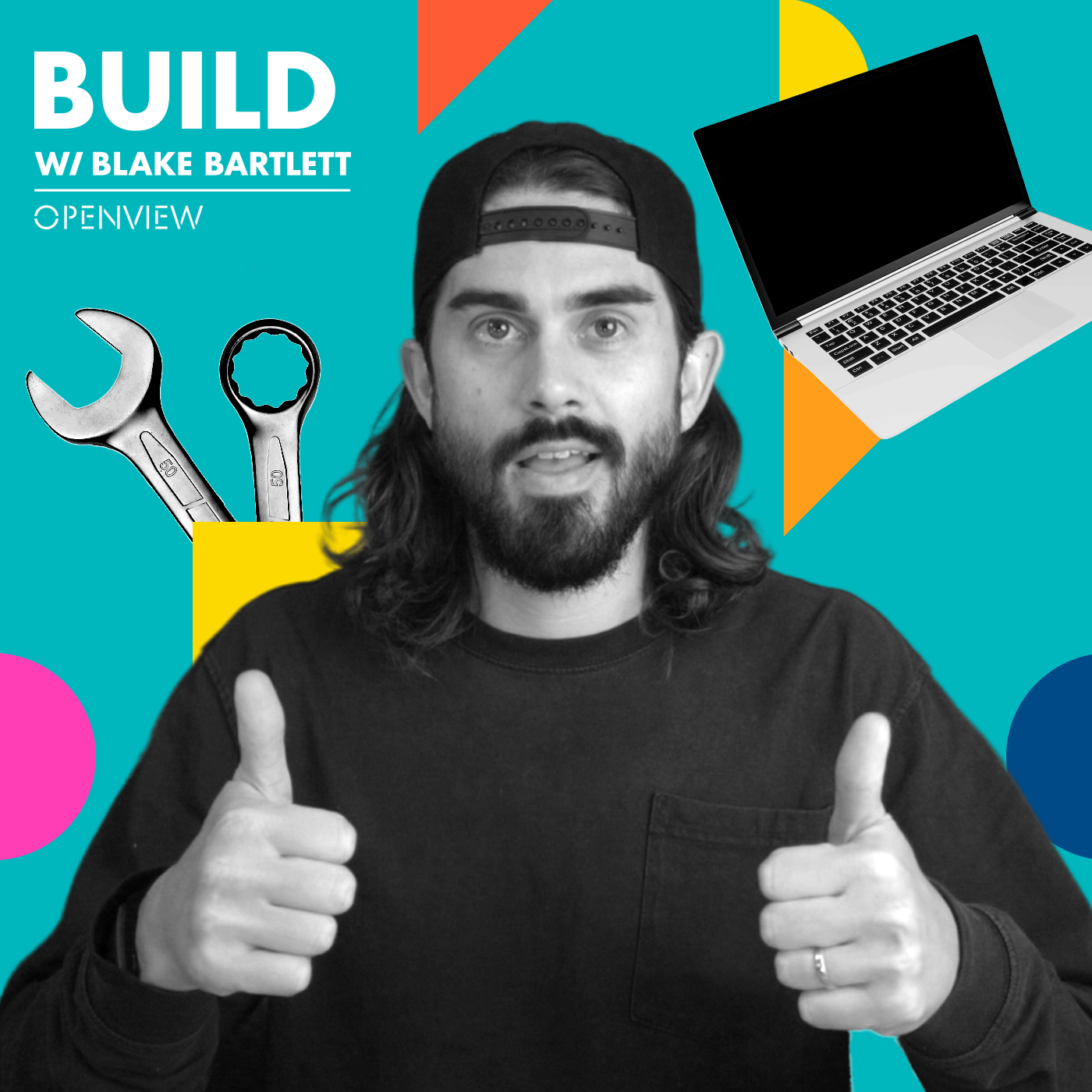
Blake Bartlett
Today's Guests
Jordan Walker
